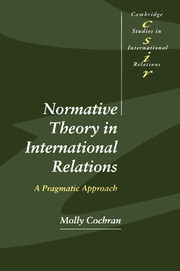Book contents
- Frontmatter
- Contents
- Acknowledgements
- Abbreviations
- Preface
- Introduction
- Part I Evaluating the impasse
- Part II Confronting the impasse
- Part III International ethics as pragmatic critique
- 6 International ethics as pragmatic critique: a pragmatic synthesis of the work of John Dewey and Richard Rorty
- 7 Facilitating moral inclusion: feminism and pragmatic critique
- 8 From moral imagination to international public spheres: the political and institutional implications of pragmatic critique
- Conclusion
- References
- Index
- CAMBRIDGE STUDIES IN INTERNATIONAL RELATIONS
6 - International ethics as pragmatic critique: a pragmatic synthesis of the work of John Dewey and Richard Rorty
Published online by Cambridge University Press: 22 September 2009
- Frontmatter
- Contents
- Acknowledgements
- Abbreviations
- Preface
- Introduction
- Part I Evaluating the impasse
- Part II Confronting the impasse
- Part III International ethics as pragmatic critique
- 6 International ethics as pragmatic critique: a pragmatic synthesis of the work of John Dewey and Richard Rorty
- 7 Facilitating moral inclusion: feminism and pragmatic critique
- 8 From moral imagination to international public spheres: the political and institutional implications of pragmatic critique
- Conclusion
- References
- Index
- CAMBRIDGE STUDIES IN INTERNATIONAL RELATIONS
Summary
Pragmatism solves no real problems. It only shows that supposed problems are not real problems.
(Peirce 1958b: 25)This book has been concerned with the present condition of stasis in normative IR theory: the positions taken in the cosmopolitan/communitarian debate on its three central issues – a concept of the self, the moral standing of states and the universal versus the particular – are assumed to be irreconcilable with no means available for reaching conclusions regarding an ethical theory of IR. As discussed in the introduction, one could see such an impasse to be a cause for concern, since without resolution, without some ground for deciding upon criteria, how else can normative judgements in IR be offered? On the other hand, another might suggest, as indeed Chris Brown does, that there is no point in being concerned, since we must accept and find satisfaction in the only thing that can result from such a debate: ‘good conversation’ (1992: 239). Here, I will suggest there is an alternative way of looking at this impasse, a pragmatist approach, which may hold the promise of pulling normative IR theory out of its epistemological quagmire.
Since pragmatism regards the search for universal foundations for knowledge to be a delusion and thus, a distraction, the pragmatist would take issue with the first response that some resolution to the question of justification within the debate be found. Centuries of such philosophical endeavour has proved unprofitable.
- Type
- Chapter
- Information
- Normative Theory in International RelationsA Pragmatic Approach, pp. 173 - 211Publisher: Cambridge University PressPrint publication year: 1999



